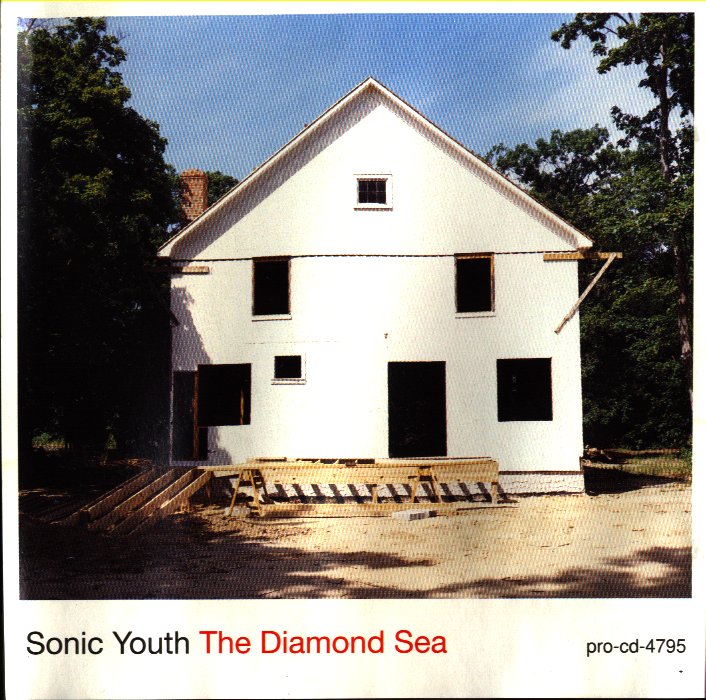The Diamond Sea (Washing Machine, Side B)
Sonic Youth
DGC Records 1995
Listen on Spotify
Which is more
surprising- that Sonic Youth released a lead single that evoked descriptors
like “stunning” and “beautiful,” or that they did so in the form of a twenty-minute
symphony of scarcity? Yes, this is the same Sonic Youth that comfortably reside
at the precipice of post-punk grunge music, who have made a career out of accentuating
the abrasiveness of supremely talented instrumentalists and, for lack of
another word, love to beat the hell out of their famous Jazzmaster guitars.
Unbeknownst to
anyone else, hidden underneath layers of angst, sex-drive, and pulsating
rhythms, was a desire to bring out the intimacy in their music, and it
culminated in the most contemplative and expansive song the band ever recorded.
That isn’t to say that it’s quiet, but it is much more methodical and pensive
than the majority of its previous work. The trademark screeching of frantic
guitars still makes appearances, but that isn’t the point. Rather, the piece is a powerful sound experiment that takes
the focus away from traditional song structures and towards the murkiness of the
band’s characteristic and idiosyncratic guitar sounds.
“Time takes its
crazy toll,” Thurston Moore sings to begin the spectacle that caps off the positively-viewed
Washing Machine. He is right, of
course, after reflecting upon a period that saw him and Kim Gordon, also a singer
and guitarist in the band, get married and have their first child. In contrast
to Gordon’s voice, which at its most crass is almost unintelligible, the song
showcases Moore’s delivery as crystal clear and ethereal in its two short
appearances. Alternating between words of warning (“You reflected into his
looking glass soul/ Now the mirror is your only friend”) and offering advice (“Sail
into the heart of the lonely storm/ And tell her that you’ll love her eternally”),
the delicate lyrics are both surprising and comforting.
What sets the
song apart is its dedication to continuity in its textures. From the onset, the
wah-wah sounds of delay effects signal a commitment to the group’s ethos- noise
creation, atypical guitar tunings, and the organized chaos of extensive
reverberation and feedback loops. The trio of guitars (Gordon, Moore, and the
irreplaceable Lee Ranaldo) wander around the unusually subdued percussion of
drummer Steve Shelley; at times droning and swirling without a sense of
direction, and at others strutting and interweaving in a more traditional sense.
To the
unfamiliar listener, the notion of intimacy and acute focus carry an enormous
asterisk- the song embodies intimacy in a Sonic
Youth sense. After all, this is the same group that was influenced heavily
by ferocious noise bands of the 1980s like The Jesus and Mary Chain and My
Bloody Valentine. In other words, the song still contains the grunge-laden
hardcore themes of past successes and influences, only with a fragility unseen
to this point in their careers.
By the time
Moore’s voice returns for a brief intermission after seven and a half minutes
of jamming, we are reminded that the listening experience did not happen in a
vacuum- time actually has passed us
by, and the imagery (“look into his eyes and you shall see/ why everything is
quiet and nothing’s free”) is as vast and daunting as the allusions to the sea.
This idea materializes in sonic form through reverb-drenched noise that fills the
remaining twelve minutes. It ebbs and flows, fades in and out, and casts an
aural shadow that begins at a lull and eventually
swirls into the suffocating but deeply intriguing feedback that fans have grown
accustomed to. It’s fascinating, terrifying, maddening, and exactly why Sonic
Youth is one of the most ingenuitive bands of its era.
“The Diamond Sea”
is a winding tour through the ideas that have sparked the now-split band’s
enviable triumphs. Moore’s lyrics are surrounded by a brief pop melody that
brings back early memories of Daydream
Nation. Ranaldo finds himself at his consistent best playing with and off
of Gordon. The unfurling and volatile noise that closes the track is what
listeners knew they always wanted. The song is less a fork in the road than it
is a line in the sand. This is who they are. The courage to paint that picture in
a bold, new way is deeply satisfying.


